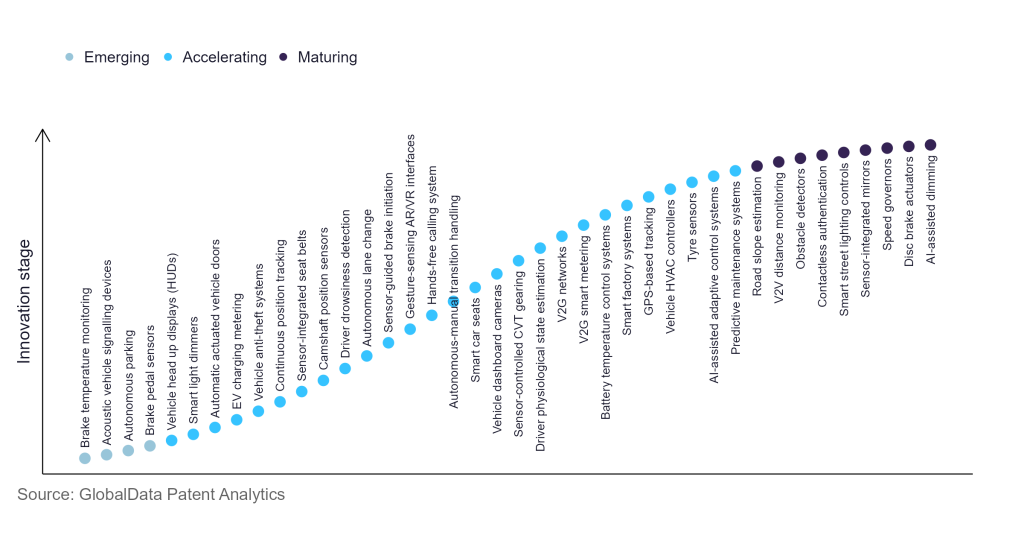The automotive industry continues to be a hotbed of innovation, with activity driven by the need for enhanced vehicle safety at night, autonomous and connected vehicles, and growing importance of technologies such as forward phase dimming and reverse phase (ELV) dimming. In the last three years alone, there have been over 1.2 million patents filed and granted in the automotive industry, according to GlobalData’s report on Internet of Things in Automotive: Smart light dimmers. Buy the report here.

Discover B2B Marketing That Performs
Combine business intelligence and editorial excellence to reach engaged professionals across 36 leading media platforms.
However, not all innovations are equal and nor do they follow a constant upward trend. Instead, their evolution takes the form of an S-shaped curve that reflects their typical lifecycle from early emergence to accelerating adoption, before finally stabilising and reaching maturity.
Identifying where a particular innovation is on this journey, especially those that are in the emerging and accelerating stages, is essential for understanding their current level of adoption and the likely future trajectory and impact they will have.
290+ innovations will shape the automotive industry
According to GlobalData’s Technology Foresights, which plots the S-curve for the automotive industry using innovation intensity models built on over 619,000 patents, there are 290+ innovation areas that will shape the future of the industry.
Within the emerging innovation stage, acoustic vehicle signalling devices, autonomous parking, and brake pedal sensors are disruptive technologies that are in the early stages of application and should be tracked closely. Vehicle head up displays (HUDs), smart light dimmers, and automatic actuated vehicle doors are some of the accelerating innovation areas, where adoption has been steadily increasing. Among maturing innovation areas are road slope estimation and V2V distance monitoring, which are now well established in the industry..
Innovation S-curve for IoT in the automotive industry

Smart light dimmers is a key innovation area in IoT
Smart light dimmers automatically manage light intensity and beam settings based on input parameters received from the environment. The smart light dimmers operate the lights using an LDR sensor, with high/low beams being managed using a front body-mounted camera, while left/right movement is managed based on steering position and up/down movement based on incline/decline.
GlobalData’s analysis also uncovers the companies at the forefront of each innovation area and assesses the potential reach and impact of their patenting activity across different applications and geographies. According to GlobalData, there are 100+ companies, spanning technology vendors, established automotive companies, and up-and-coming start-ups engaged in the development and application of smart light dimmers.
Key players in smart light dimmers – a disruptive innovation in the automotive industry
‘Application diversity’ measures the number of different applications identified for each relevant patent and broadly splits companies into either ‘niche’ or ‘diversified’ innovators.
‘Geographic reach’ refers to the number of different countries each relevant patent is registered in and reflects the breadth of geographic application intended, ranging from ‘global’ to ‘local’.
Ford is a key player in the smart light dimmers innovation area with 319 patents filed. The company’s smart light dimmers can automatically turn on or off when required and feature a driver-activated system with a windshield-mounted camera that can scan the road. The smart dimmer turns on the lights based on the road conditions to improve visibility and dims the lights to low beam to reduce glare for approaching vehicles. Wolfspeed, AMS, Panasonic and LG are some of the other key players.
To further understand how IoT is disrupting the automotive industry, access GlobalData’s latest thematic research report on Internet of Things (IoT) in Automotive.
Data Insights
From

The gold standard of business intelligence.
Blending expert knowledge with cutting-edge technology, GlobalData’s unrivalled proprietary data will enable you to decode what’s happening in your market. You can make better informed decisions and gain a future-proof advantage over your competitors.





